Civilization V – Brave New World Expansion
Developer: Firaxis Games
Publisher: 2K Games
Author: Son_of_Montfort
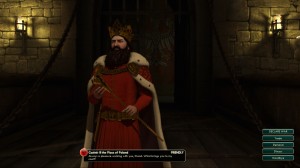 Historians, when defining the term “civilization,” emphasize the fact that all civilizations include gatherings of people, have some form of social, political, military, and religious hierarchy, and enjoy cultural developments in art, music, and literature. When playing Sid Meier’s Civilization V, it was quite easy to simulate the urban focus attributed to the great civilizations and the player could easily grab the reigns of social, political, and military authority. It was not until the Gods and Kings expansion that players could form their own religious authorities, conferring the benefits of belief to their citizens and attempting to spread that belief through zealous use of missionaries and prophets.
Historians, when defining the term “civilization,” emphasize the fact that all civilizations include gatherings of people, have some form of social, political, military, and religious hierarchy, and enjoy cultural developments in art, music, and literature. When playing Sid Meier’s Civilization V, it was quite easy to simulate the urban focus attributed to the great civilizations and the player could easily grab the reigns of social, political, and military authority. It was not until the Gods and Kings expansion that players could form their own religious authorities, conferring the benefits of belief to their citizens and attempting to spread that belief through zealous use of missionaries and prophets.
Still, Civ V gave short shrift to one major aspect of civilization, culture. Yes, players gained social policies through culture growth and could eventually build a theoretical “utopia project” to achieve a cultural victory, but this did not accurately represent how cultures really influenced one another by trade, proximity, aligned ideology, and how some civilizations cultivated a rich and popular society full of music, art, and writing. What I really mean is, until Brave New World, Civ V did not offer the option for players to use The Beatles to conquer the world.
Thus, Brave New World (hereafter BNW) primarily focused on expanding the culture system of Civ V, givs it an almost complete (and much needed) overhaul. Before BNW, culture was frankly boring. It was a bar to fill in by building culture generating buildings to get to the next level of a social policy. Fill enough of these in and you win (but it was often easier to build a spacecraft than to wait until you got enough policy trees).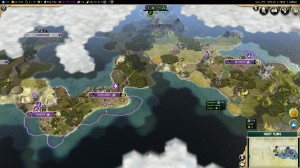
In BNW, the social policy tree has been completely overhauled and culture has been split into two sections, defensive culture that accumulates exactly like pre-BNW culture and leads to social progress and tourism, an offensive type of culture that can lead to victory if it overcomes all of the culture levels of each enemy civilization.
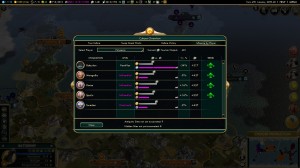 Tourism is a very interesting addition. Initially, your civilization will not generate tourism, only defensive culture. Early in the mid-game portion, tourism will begin to accumulate as players expend a much more varied set of Great People – Great Artists, Great Writers, and Great Musicians – to create tourism objects represented by named great works of art, music, and writing.
Tourism is a very interesting addition. Initially, your civilization will not generate tourism, only defensive culture. Early in the mid-game portion, tourism will begin to accumulate as players expend a much more varied set of Great People – Great Artists, Great Writers, and Great Musicians – to create tourism objects represented by named great works of art, music, and writing.
Not only is this a neat mechanic, but as all Great People are named, when players expend them to create a great work, they are greeted with a picture of the art, a line from the work of literature, or a small snippet of the musical piece. There is something really great about being shown Georges Seurat’s A Sunday Afternoon on the Island of La Grand Jatte or hearing a few bars of Handel as a reward for cultivating a Great Person.
These great works are then slotted into buildings that have existed in previous versions of Civ V to begin generating tourism. For example, amphitheaters house written works, opera houses music, and some wonders, such as the Louvre, can be used for a variety of works. It all feels complex yet streamlined and gives players a use for the formerly bland Great People of culture and presents new options for victory.
To make tourism even more interesting in the late-game is the addition of the archaeologist unit. These intrepid explorers, like missionaries, travel the world to bring back artifacts to benefit their home culture. Once museums are discovered, a number of antiquities sites sprout up all over the map. Archaeologists are spent in exploring those and offer the choice between granting a tourism producing artifact to be placed in museum slots or an on-the-map culture site to generate resources for a nearby city.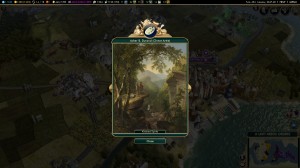
The artifacts gained are based upon where the artifact was found, so if a player early in the game destroys a barbarian encampment or razes a Mongol city, they might find ancient barbarian arrowheads or a classical-era Mongol pottery shard. This is a very cool addition with a palpable influence on gameplay as properly gathering these artifacts can drastically increase both tourism and culture. Remember, it belongs in a museum!
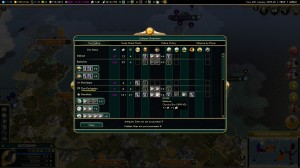 But having the greatest tourist culture is not a guaranteed way to win and BNW balances this new victory condition with a variety of changes, both overt and subtle. Gaining too high of a tourism level undoubtedly leads to hostility from other civilizations: just because they like your blue jeans and music doesn’t mean they like you.
But having the greatest tourist culture is not a guaranteed way to win and BNW balances this new victory condition with a variety of changes, both overt and subtle. Gaining too high of a tourism level undoubtedly leads to hostility from other civilizations: just because they like your blue jeans and music doesn’t mean they like you.
Several of the new civs are either geared to be more aggressive or to be more economically and scientifically competitive. Back from his long Civilization hiatus is old-time favorite Shaka Zulu and he remains just as aggressive and cunning as his previous incarnations. New additions are drawn from other notable historical figures, such as the ruthless King Ashurbanipal of the Assyrians, progressive King Casimir III of Poland, or the shrewd merchant Sultan Al-Mansur of Morocco. A few of the new additions are not likely as immediately recognizable to many fans, just as Pedro of Brazil or Kamehameha I of Polynesia, but these factions are equally welcome additions and extremely fun to play.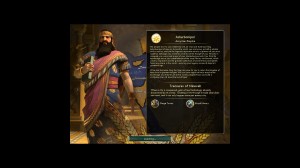
All in all, the stable of famous leaders is outstanding and there are options for every type of victory, be it tourism, science, diplomacy, or military might. Even some of the old leaders, such as Napoleon, have been tweaked to better fit into the new system, meaning that playing your old standbys provides a new gaming experience. Some of the civilizations have been granted special map improvements rather than buildings, so it is neat to see Polynesian Mo’ai statues or French chateaux dot the landscape. This addition further differentiates civilizations both mechanically and visually.
As an aside, one of the new Civs, Venice, offers a completely unique style of play that deserves special mention. Venice is only ever allowed direct control over its founding city of Venice, any new cities conquered or acquired must be made into puppets or razed. Venice has a special type of Great Merchant that can “buy” city states (it costs no actual gold), incorporating that city state as a puppet (with the happiness penalty) into Venice’s empire. Venice also gets the special ability to be able to purchase units and items in puppet states, and it supported in that ability with double the amount of trade routes. So managing only one major city and expending tons of gold to expand and defend your territory offers a totally different way to play Civ V. It won’t appeal to all fans, but it is nice to see such innovative thinking from the developers.
The above paragraph on Venice hints at another major addition, trade routes. Now civilizations have to build and manage caravans and cargo ships that produce income, share technology, offer increased tourism influence, and help spread religions. This could have been a micromanagement annoyance, but instead it is made simple and easy.
Every 30 turns caravans and cargo ships are assigned a route, which they will keep to until their 30 turns are up and their route can be changed. Trade routes can also be pillaged, offering a good chunk of gold to the aggressive party (or worthless bastard barbarians, depending on your level of pottymouth) and cutting off income to the owner. With some of the new fiscal changes, trade routes are a necessity and ignoring them will lead to massive debt and failure. While this does not allow for simulation of isolationist civilizations in history, the new way to make money is neat and adds a good amount to the game.
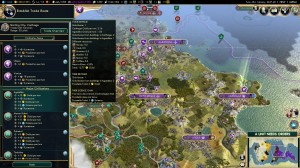 The social policy tree has also been augmented with the addition of Exploration (designed to speed up naval units and offer bonuses for traveling long-distances) and aesthetics (a tree designated to boosting culture and great person birth). When the late-game hits, as a civilization builds its third factory, an ideological path opens to offer global modifiers.
The social policy tree has also been augmented with the addition of Exploration (designed to speed up naval units and offer bonuses for traveling long-distances) and aesthetics (a tree designated to boosting culture and great person birth). When the late-game hits, as a civilization builds its third factory, an ideological path opens to offer global modifiers.
Civilizations can choose from Order, Freedom, and Authority, each with bonuses to certain goals. Authority is great for the military minded, Order provides production, and Freedom boosts happiness and tourism. But these ideology trees over a vast number of paths and choices, meaning that playing two games with the same ideology can have much different results. Ideology also has a global impact on happiness and pressure from outside ideologies that can generate unhappiness and even revolution in opposing civilizations.
The last new gameplay feature is the expansion of the UN into a World Congress. The World Congress opens up when a player develops the printing press and has discovered all of the other main civilizations (upon which they become the host of the Congress). The Congress allows, like the UN, for a diplomatic victory in the late game, but BNW has expanded its role to make it have a large amount of influence on the course of the game.
Civilizations use delegates to vote on a variety of initiatives that can lead to immediate disruption or change – such as banning the use of a luxury good or forcing a complete trade embargo of a specific city-state or civilization. Suddenly being embargoed or losing your happiness protecting resources can be a major hit, so participation in the congress becomes a big issue. Diplomacy can be used to “buy” votes from other players and choosing certain initiatives can create friction between civs. It takes what was formerly a fairly mundane part of the game and transforms it into something new and active. In many ways, it reminds me of the Congress in Alpha Centauri, and that is a very good thing.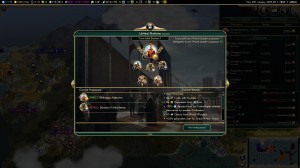
BNW is not without its flaws, although they are relatively minor. The most noticeable failing is that the behavior of enemy civs continues to be highly quirky and often inscrutable. Friendly civs will suddenly denounce you without warning, wars are declared with little provocation, and run-away leaders are allowed to get more powerful while weaker civs are preyed upon. This is mitigated by the leader personalities (i.e. you can expect Shaka to watch you for any sign of weakness and pounce) but still there is a lot of strange stuff.
The AI seems to handle the new additions pretty well, however, and I even saw one game where the AI had almost overcome the world with its grand culture (if only I had not stood in the way). It also feels that some of the BNW civilization powers are far less useful than others and some special units, like the Polynesian Maori Warriors, are eclipsed so early in the game that they feel underwhelming.
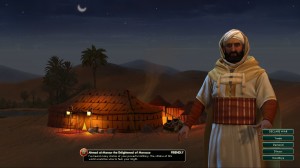 Besides these points, Brave New World is an excellent expansion to an already impressive game. Not a simple patch or shiny new veneer, BNW drastically changes and improves some of the key mechanics of the Civ V system. This leads to a more entertaining, well-rounded, and in some cases, more challenging game. Fans of the series will find a lot to love that is very different that previous Civ games. Civ V’s detractors will likely find some of their (legitimate) criticisms have been answered. At the end of the day, this is a game that will keep you screaming “just one more turn” until the wee hours of the morning.
Besides these points, Brave New World is an excellent expansion to an already impressive game. Not a simple patch or shiny new veneer, BNW drastically changes and improves some of the key mechanics of the Civ V system. This leads to a more entertaining, well-rounded, and in some cases, more challenging game. Fans of the series will find a lot to love that is very different that previous Civ games. Civ V’s detractors will likely find some of their (legitimate) criticisms have been answered. At the end of the day, this is a game that will keep you screaming “just one more turn” until the wee hours of the morning.
But keep an eye on Shaka Zulu. I owe that guy a few razed cities.


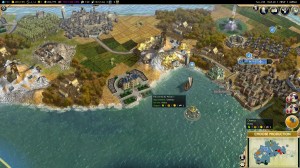
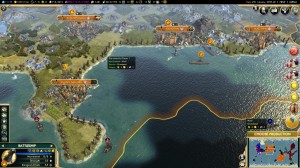
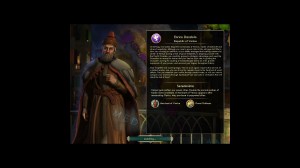
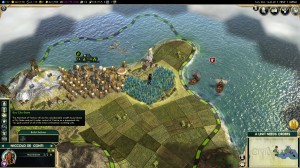
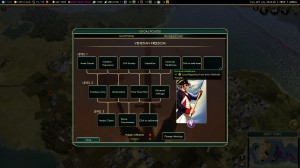
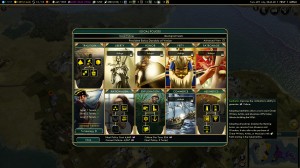
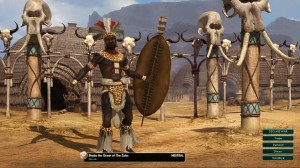

Got 1 win under my belt at Venice. Conquered Rome, mainly b/c they were pissing me off, but also b/c they had founded a few cities in places I would’ve like to have my own cities, so conquering them added to Venice’s realm.
Late game – Atomic Age – I was pulling in about 500 GPT (w/o Golden Ages) and was able to buy off most of the city-state votes I needed to get elected World Leader w/ the UN.
The Trade Routes are a great new tool for moving money, science, and religion around and a nifty new mechanic. I chose to play as Venice mainly to try those out, and they were extremely cool. It can also make embargoes potentially devastating.